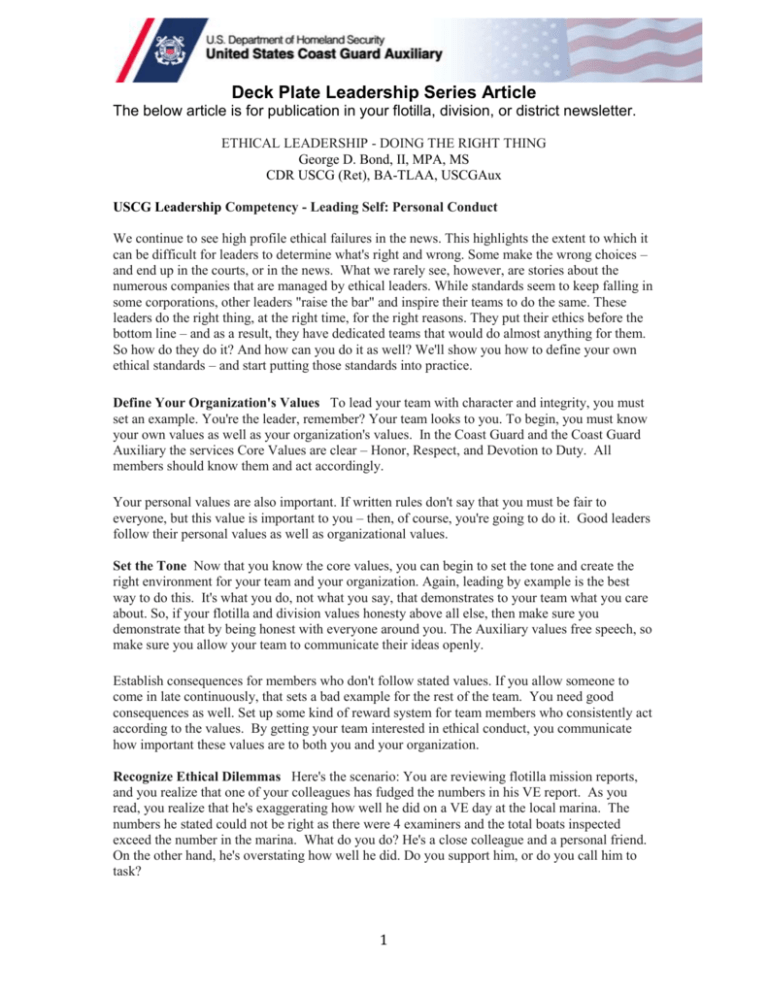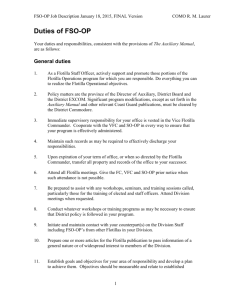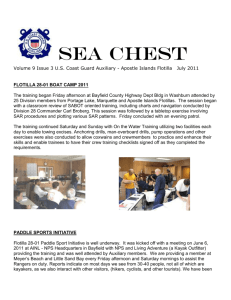Ethical Leadership - U.S. Coast Guard Auxiliary
advertisement

Deck Plate Leadership Series Article The below article is for publication in your flotilla, division, or district newsletter. ETHICAL LEADERSHIP - DOING THE RIGHT THING George D. Bond, II, MPA, MS CDR USCG (Ret), BA-TLAA, USCGAux USCG Leadership Competency - Leading Self: Personal Conduct We continue to see high profile ethical failures in the news. This highlights the extent to which it can be difficult for leaders to determine what's right and wrong. Some make the wrong choices – and end up in the courts, or in the news. What we rarely see, however, are stories about the numerous companies that are managed by ethical leaders. While standards seem to keep falling in some corporations, other leaders "raise the bar" and inspire their teams to do the same. These leaders do the right thing, at the right time, for the right reasons. They put their ethics before the bottom line – and as a result, they have dedicated teams that would do almost anything for them. So how do they do it? And how can you do it as well? We'll show you how to define your own ethical standards – and start putting those standards into practice. Define Your Organization's Values To lead your team with character and integrity, you must set an example. You're the leader, remember? Your team looks to you. To begin, you must know your own values as well as your organization's values. In the Coast Guard and the Coast Guard Auxiliary the services Core Values are clear – Honor, Respect, and Devotion to Duty. All members should know them and act accordingly. Your personal values are also important. If written rules don't say that you must be fair to everyone, but this value is important to you – then, of course, you're going to do it. Good leaders follow their personal values as well as organizational values. Set the Tone Now that you know the core values, you can begin to set the tone and create the right environment for your team and your organization. Again, leading by example is the best way to do this. It's what you do, not what you say, that demonstrates to your team what you care about. So, if your flotilla and division values honesty above all else, then make sure you demonstrate that by being honest with everyone around you. The Auxiliary values free speech, so make sure you allow your team to communicate their ideas openly. Establish consequences for members who don't follow stated values. If you allow someone to come in late continuously, that sets a bad example for the rest of the team. You need good consequences as well. Set up some kind of reward system for team members who consistently act according to the values. By getting your team interested in ethical conduct, you communicate how important these values are to both you and your organization. Recognize Ethical Dilemmas Here's the scenario: You are reviewing flotilla mission reports, and you realize that one of your colleagues has fudged the numbers in his VE report. As you read, you realize that he's exaggerating how well he did on a VE day at the local marina. The numbers he stated could not be right as there were 4 examiners and the total boats inspected exceed the number in the marina. What do you do? He's a close colleague and a personal friend. On the other hand, he's overstating how well he did. Do you support him, or do you call him to task? 1 Deck Plate Leadership Series Article The below article is for publication in your flotilla, division, or district newsletter. So, how do you recognize these dilemmas? • Identify "trigger" situations – Certain situations attract ethical dilemmas. Some of these are areas like purchasing, hiring, firing, promoting, and rewarding. • There can also be other unexpected situations. You could make a mistake – will you admit it, or try to cover it up? Or you could discover that a colleague is acting unethically – do you protect the person or tell someone? • By recognizing when these situations might occur, you can make the right decisions when and if something actually happens. • Prepare in advance – Imagine yourself in the situations we just mentioned. What would you do if you knew one of your colleagues was about to be fired, but you weren't legally allowed to tell her? • Putting yourself in these imaginary situations can help you work through your feelings and decide what you would do if the situation became real. In real life, you may have only seconds to reach a decision. Of course, you won't be able to imagine every possible ethical dilemma you might face, but this exercise WILL help you get to know your values, and it can prepare you for the decisions you may have to make. • Listen to your "inner voice" – Your conscience often tells you that something isn't right, even if this is just a feeling of uneasiness with something. If you face a situation that makes you uncomfortable, or goes against one of your core values or beliefs, then make sure that you stop and think things through rationally. • Reevaluate your decision before you act – If you're in a difficult situation and you aren't sure what to do, make a decision. But before you act on that decision, ask yourself how you would feel if your actions were in the company newsletter or on the evening news for everyone to see. Would you be proud of what you did? If not, then reconsider your decision. When in Doubt...At times, you'll make a decision but still wonder if you did the right thing. You may be uncomfortable, but these situations can teach you to trust yourself and your instincts. If you calm your anxiety and look logically at the situation, your instincts will often guide you in the right direction. Key Points Ethical living – and leading – takes courage and conviction. It means doing the right thing, even when the right thing isn't popular or easy. But when you make decisions based on your core values, then you tell the world that you can't be bought – and you lead your team by example. Once you identify your company's core values as well as your own, you can start to set the tone with your team and your organization. Actions always speak louder than words, so make sure you do as you would wish others to do. For more information go to http://www.mindtools.com/mindtoolsapp 2









